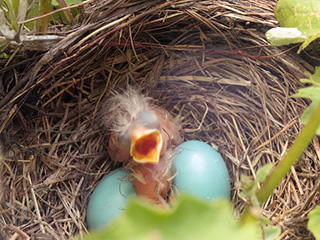When Baby Birds Die Do Mothers Close the Nest Up
When you come up across a helpless-looking infant bird out of its nest, it'southward difficult to resist the overpowering urge to come to the rescue.
→ But well-nigh of the fourth dimension it'south best to do nothing. ←
Many birds that people try to rescue are still being cared for past their parents (even if you can't see them) and should be left alone.
Here's a primer on when to accept action for songbirds (baby ducks or geese require a different arroyo); when in doubt, contact a licensed wildlife rehabilitator.
Found a infant bird?Wondering what to practice? Check out our infographic > |
Assess for Injury
The start thing to practice when you notice a baby songbird is to figure out if information technology's injured. Baby birds can naturally look weak, but if you run across claret or other obvious harm, contact a licensed wildlife rehabilitator.
You should too call a rehabilitator if you know a true cat attacked a bird; felines transmit deadly bacterial infections with fifty-fifty mild scratches.
Determine Age
Baby birds become through three stages:
- Hatchling (usually 0-3 days one-time). It hasn't yet opened its eyes, and may have wisps of downward on its trunk. It's non ready to leave the nest.
- Nestling (usually iii-13 days old). Its eyes are open, and its wing feathers may look like tubes because they've yet to pause through their protective sheaths. It's also not ready to leave the nest.
- Fledgling (13-fourteen days quondam or older). This bird is fully feathered. Its wings and tail may be brusk, and it may not exist a great flyer, but it tin walk, hop, or palpitate. Information technology has left the nest, though its parents may be nearby, taking good care of it.
Assist Hatchlings and Nestlings
If you find a hatchling or a nestling on the ground and you can see its nest, you should try to safely return it. Opposite to popular belief, birds exercise not have a well-developed sense of smell. Therefore, the parents won't know if a young bird has been touched past people and will not carelessness their immature.
If there'southward no nest, you lot can brand one by fastening a container to a branch. A modest basket is platonic, but you can utilise a plastic container such as a margarine tub and punch holes through the bottom. Sides should exist no college than 4 inches. Cutting 2 pieces of wire to 18-inch lengths and thread them upward through the bottom of the container and down again. Securely wire it to the top of a co-operative in the same tree or shrub as the nest, and line the container with dry grass. Identify the bird within the basket.
Give Fledglings Room to Grow
If you lot find a fledgling, the best course of action is to leave it solitary. As bad-mannered as a fledgling bird may await, this is natural stage, and the parents are most likely nearby, hunting for food and keeping watch. If the bird's in immediate danger, you tin put it in a nearby bush or tree.
Don't Raise Baby Birds Yourself
It's illegal to bring a babe bird domicile and try to raise it. Well-nigh young birds won't survive if cared for past well pregnant but inexperienced people. Those that do survive will exist at a disadvantage. They'll have missed important lessons that they would have learned from their parents, such as how to find food and water in the wild and how to avoid predators.
Protect Baby Birds from Cats
While all birds are threatened by outdoor cats, baby birds are specially vulnerable. Birds should never be removed from the wild to protect them from cats or other predators. If there is a infant bird on the ground and a cat nearby, put the cat indoors until the bird is able to wing. If the cat belongs to a neighbor, ask the owner to remove the true cat or, when the owner is non known, spray the cat with water to encourage information technology to leave the holding.
Birds and the Law
Birds are protected by federal laws under the Migratory Bird Treaty Act (MBTA) of 1918 also equally by Massachusetts state laws. Unless y'all're a licensed wildlife rehabilitator, information technology's illegal to proceed wild birds in your possession. The simply exceptions are non-native species: Firm Sparrows, European Starlings, and Pigeons.
Source: https://www.massaudubon.org/learn/nature-wildlife/birds/baby-birds-out-of-the-nest


0 Response to "When Baby Birds Die Do Mothers Close the Nest Up"
Post a Comment